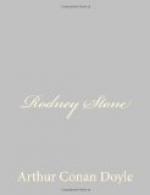“All the Stones have been in the sea-service,” said my mother, apologetically to my uncle, “and it is a great chance that he should enter under Lord Nelson’s own patronage. But we can never forget your kindness, Charles, in showing our dear Rodney something of the world.”
“On the contrary, sister Mary,” said my uncle, graciously, “your son has been an excellent companion to me—so much so that I fear that I am open to the charge of having neglected my dear Fidelio. I trust that I bring him back somewhat more polished than I found him. It would be folly to call him distingue, but he is at least unobjectionable. Nature has denied him the highest gifts, and I find him adverse to employing the compensating advantages of art; but, at least, I have shown him something of life, and I have taught him a few lessons in finesse and deportment which may appear to be wasted upon him at present, but which, none the less, may come back to him in his more mature years. If his career in town has been a disappointment to me, the reason lies mainly in the fact that I am foolish enough to measure others by the standard which I have myself set. I am well disposed towards him, however, and I consider him eminently adapted for the profession which he is about to adopt.”
He held out his sacred snuff-box to me as he spoke, as a solemn pledge of his goodwill, and, as I look back at him, there is no moment at which I see him more plainly than that with the old mischievous light dancing once more in his large intolerant eyes, one thumb in the armpit of his vest, and the little shining box held out upon his snow-white palm. He was a type and leader of a strange breed of men which has vanished away from England—the full-blooded, virile buck, exquisite in his dress, narrow in his thoughts, coarse in his amusements, and eccentric in his habits. They walk across the bright stage of English history with their finicky step, their preposterous cravats, their high collars, their dangling seals, and they vanish into those dark wings from which there is no return. The world has outgrown them, and there is no place now for their strange fashions, their practical jokes, and carefully cultivated eccentricities. And yet behind this outer veiling of folly, with which they so carefully draped themselves, they were often men of strong character and robust personality. The languid loungers of St. James’s were also the yachtsmen of the Solent, the fine riders of the shires, and the hardy fighters in many a wayside battle and many a morning frolic. Wellington picked his best officers from amongst them. They condescended occasionally to poetry or oratory; and Byron, Charles James Fox, Sheridan, and Castlereagh, preserved some reputation amongst them, in spite of their publicity. I cannot think how the historian of the future can hope to understand them, when I, who knew one of them so well, and bore his blood in my veins, could never quite tell how much of him was real, and how much was due to the affectations which he had cultivated so long that they had ceased to deserve the name. Through the chinks of that armour of folly I have sometimes thought that I had caught a glimpse of a good and true man within, and it pleases me to hope that I was right.




